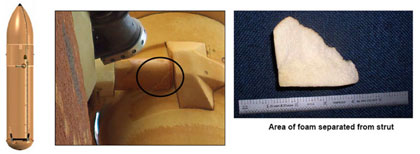Shuttle launch a 'go' despite problem
(AP)
Updated: 2006-07-04 14:37
NASA signed off Monday night on a Fourth of July shuttle liftoff despite
worries about a piece of foam that popped off Discovery's external fuel tank
while the spacecraft sat on the launch pad.
"We're going to continue with the launch countdown," said Bill Gerstenmaier,
NASA associate administrator, at a nighttime briefing.

A graphic from NASA
shows the external fuel tank, close-up of the lock speedline bracket
showing an area of missing foam and a photo of the missing chunk of foam
from space shuttle Discovery's external fuel tank in Cape Canaveral July
3, 2006. [Reuters] |
The decision for the 2:38 p.m. EDT Tuesday liftoff was sure to stir more
debate about whether the space agency was putting its flight schedule ahead of
safety even though Gerstenmaier said "there were no dissenters ... no concerns
raised" at a meeting of managers.
He said the astronauts and NASA administrator Michael Griffin were in on the
discussion. Griffin "didn't raise any question or comments but he listened
intently," Gerstenmaier said.
The 3-inch triangular piece of foam that appeared to come from a 5-inch-long
crack late Sunday or early Monday is far smaller than the foam chunk that
brought down Columbia, killing seven astronauts in 2003. Gerstenmaier showed
reporters the piece of foam, which looked like a wedge of toast.
"I don't think we're taking any additional risk than we did in our original
assessment" in going ahead with a launch, he said.
Managers had spent most of Monday pondering the problem. NASA has spent
millions of dollars trying to prevent foam from breaking off at liftoff,
threatening the kind of damage it did to Columbia. Engineers were startled when
it broke off Discovery during last year's mission, but it didn't harm the
shuttle.
The loss of foam from that area of the tank while on the launch pad is a rare
occurrence, happening only once before, Gerstenmaier said.
Some outside experts familiar with shuttle foam loss problems were concerned
about plans to launch Tuesday.
Carnegie Mellon University engineering and risk analysis professor Paul
Fischbeck, who had been worried earlier in the day by the falling chunk of foam,
said NASA's rationale in going ahead made sense and he is slightly more
comfortable with a launch try Tuesday.
|